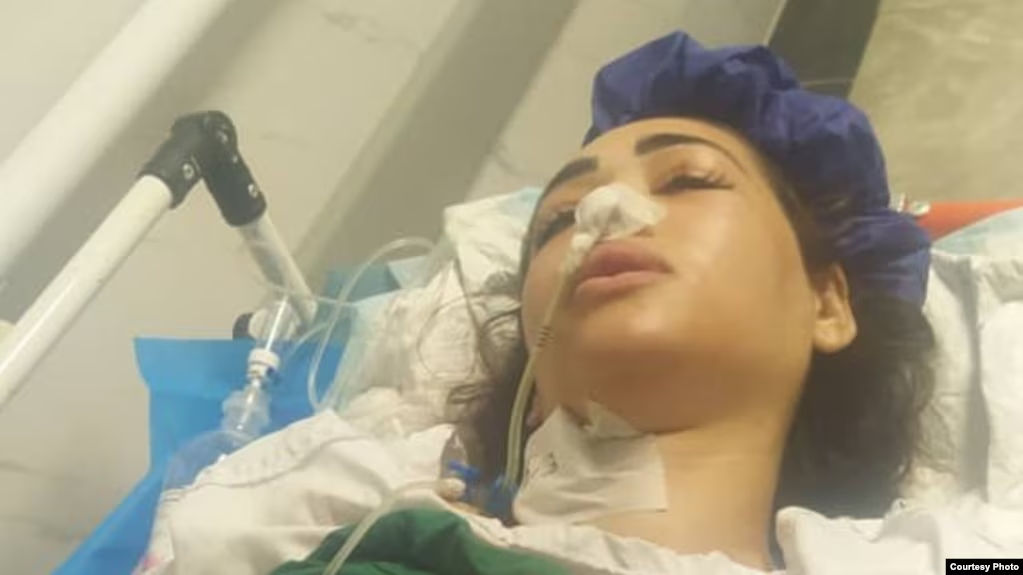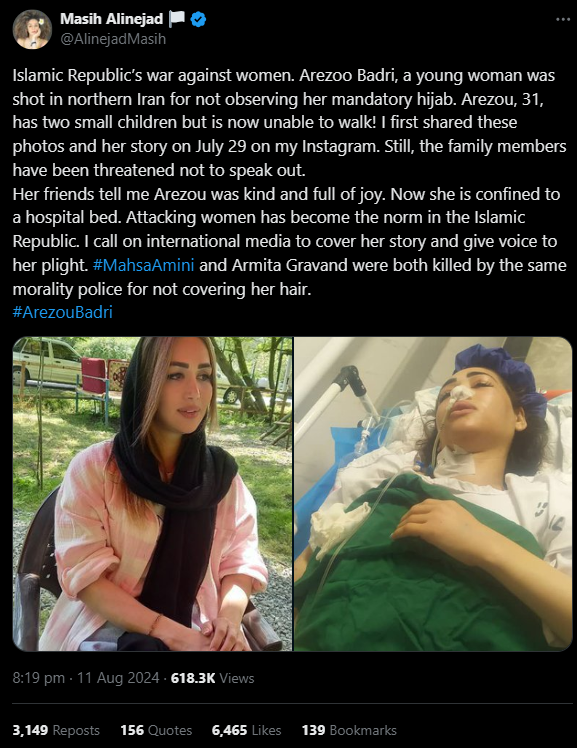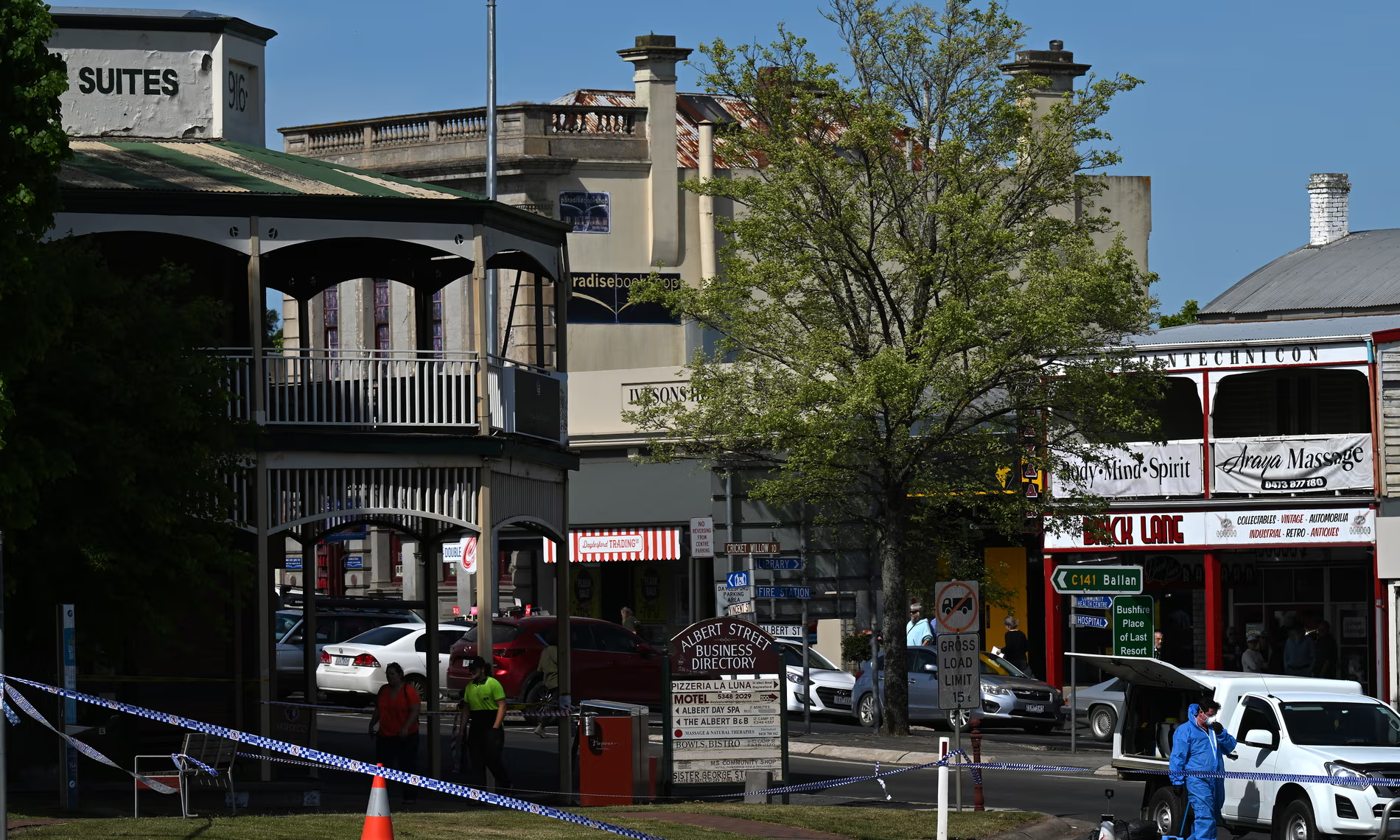The Biden administration has expressed “deep concern” about reports from Iran that police shot a mother of two in her car last month and left her partially paralyzed, apparently for her refusal to wear a hijab as mandated.
A State Department spokesperson commented in a statement sent exclusively to VOA on Sunday. “These reports, unfortunately, are consistent with the Iranian regime’s horrific use of gender-based violence against women and girls,” it said.
Rights activists have said 31-year-old Arezou Badri was partially paralyzed after police opened fire on her vehicle as she was driving with her sister in northern Iran’s Mazandaran province on July 22. The activists have cited sources in Iran as saying police shot Badri because her car was under a confiscation order for her refusal to wear a hijab in the vehicle.
Iranian authorities toughened enforcement this year of an Islamist law that requires women and girls to cover their hair with a hijab in public, even inside a vehicle. Iranian morality police enforcing that law in September 2022 detained and assaulted another young woman, Mahsa Amini, whose death in their custody sparked months of nationwide protests against Iran’s authoritarian Islamist rulers.
The State Department said the shooting of Badri “shows that the [Iranian] regime has learned nothing in the two years since the tragic and senseless killing of Amini … and that the regime’s violent crackdown on women and girls continues unabated.”
The spokesperson added, “The Iranian regime’s brutal treatment of women and girls is a key reason why it remains a pariah on the international stage and why young people leave the country in droves for opportunity and fundamental freedoms.”
The Iranian government tried last week to limit outrage over Badri’s shooting.
Iranian state news site Tasnim published a video on August 19, showing Badri as she lay in a hospital bed in Tehran.
In the Tasnim video, a reporter holding a microphone toward the bedridden Badri asks whether she is feeling better and eating well, and she makes several brief responses in the affirmative. Her father, standing next to the bed, also tells the reporter that his daughter is feeling better.
Iranian state media have said police opened fire on Badri’s car because it ignored orders to stop.
An Iranian judiciary spokesman told an August 20 press conference that the shooter was detained and placed under investigation, but denied there was any connection to enforcement of the hijab mandate.
Iranian women’s rights activist and VOA Persian TV host Masih Alinejad published the first social media photos and video of the hospitalized Badri after the shooting, with Alinejad saying she obtained them from an informed source.
In an interview for VOA’s Flashpoint podcast, published Friday, Alinejad said the Tasnim video of Badri and her father appeared to have been coerced by Iranian authorities.
“My sources told me that authorities tried to pressure Arezou and her family members to say that the shooting had nothing to do with the mandatory hijab issue. So far, the family has resisted, and the authorities have failed. But at the same time, their lives are at risk [from further pressure],” Alinejad said.
She said Iranian authorities are seeking to prevent hijab-related controversies and protests from erupting as Iran approaches the second anniversary of Mahsa Amini’s death next month.
VOA has not seen any reports from Iran of street protests related to the shooting of Badri since Alinejad began posting social media images and information about the case on July 29.
“The Iranian regime is trying to control the information. That is why there are so few people learning about what is going on in the hospital where Arezou is under pressure,” Alinejad said.
Alinejad added that her social media posts about Badri’s case have prompted some individual acts of protest.
“As soon as I published information on my social media, I got videos from Iranian women walking unveiled in the street, referring to Arezou,” Alinejad said. “Those women said, ‘We are not going to give up. We know what happened to Arezou, but we will still take off our hijab and walk in the street until the day that we are free.’”











Leave a Reply